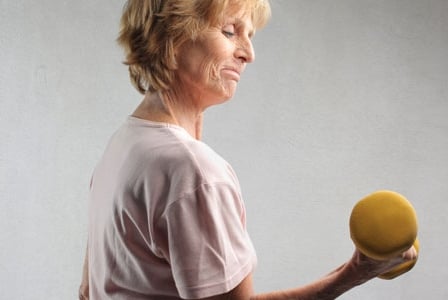
A recent study at Penn State University has found that women who were experiencing mild-to-moderate menopausal symptoms experienced fewer hot flashes after exercising.
You’re sweating buckets, but everyone else in the room looks cool as cucumbers. Unless you’ve been through menopause, you may not know just what it feels like to have your own personal heat wave—the kind that propels you to the nearest freezer to stop the sizzle.
Suffice to say that it’s a big enough concern for women of a certain age that entire scholarly journals are devoted to the science related to menopause. In a recent issue of the journal called, appropriately enough, Menopause, a new study suggests that women may be able to help turn the heat down with exercise.
Hot flashes reduced after exercise
Researchers from Penn State University studied 92 menopausal women between the ages of 40 and 59, who all experienced mild-to-moderate symptoms of menopause, over a period of 15 days. They were all given accelerometers to monitor their physical activities. They also were monitored for skin conductance (measuring the moisture level of their skin)—an objective measure of hot flashes.
Though researchers said that assumptions would lead people to believe that physical activity might increase hot flashes because of the increase in core body temperature, they found that, in fact, the opposite was true. On average the women in the study experienced fewer hot flashes after exercising.
\”For women with mild to moderate hot flashes, there is no reason to avoid physical activity for the fear of making symptoms worse,” said Steriani Elavsky, lead author of the study.
“In fact, physical activity may be helpful, and is certainly the best way to maximize health as women age. Becoming and staying active on a regular basis as part of your lifestyle is the best way to ensure healthy aging and well-being, regardless of whether you experience hot flashes or not.”
What are hot flashes?
Hot flashes occur in up to 40 percent of women in their 40s—even before menopause begins. And, sometimes they can last as long as 10 years! It’s no wonder scientists are busy trying to figure out how to douse the heat.
Though the exact cause of hot flashes is not fully understood yet, scientists believe they’re due to a combination of hormonal and biochemical fluctuations caused by declining estrogen levels. An erratic nervous system is thought to trigger the skin blood vessels to open and signal the sweat glands to do what they do best.
Other ways to turn down the temperature
- yoga breathing
- relaxation exercises
- acupuncture
- avoid alcohol
- soy beverages
- red clover
- black cohosh

